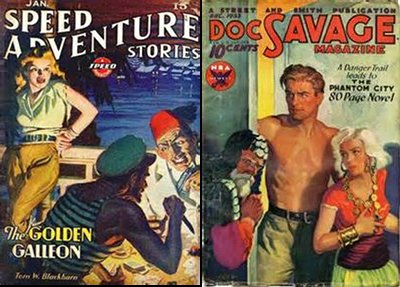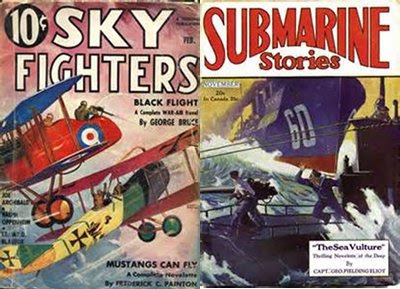Indie eBooks or ePulps?
Indie-publishing may be a very different beast than most people give it credit for. Its readership and
reader expectations differ significantly from those of traditional
publishing. It might pay to view ebooks, and especially indie-publishing, not as the 21st century version of traditional book publishing, but as the 21st century version of the fiction magazine – the
“pulps” of the past. If this is the case, then ebooks may not be the future of book publishing, but rather, destined to remain a
semi-autonomous niche market. Far fetched? Let's look at the many parallels
between the pulps and indie-publishing so that you can decide for
yourself.
The pulp magazines
of the first half of the last century were "cheap reads," like the indie-published ebooks
today. In the pulp era, when hardcover books cost
between $2 to $3, with the cheaper reprints at a $1, most pulp
magazines sold for $.10 to $.20. Today, with hardcover books' cover
price in the $20 to $30 range, and traditionally published ebooks
running $12 to $16, most indie-published ebooks cost between $1 and
$5; priced just like the pulps when compared to traditionally published books, and aimed at same, budget conscious readers. The similarities, however, go much deeper than just price.
Like the pulps,
indie-published ebooks appeal to avid readers – readers who consume
stories faster than traditional publishers release them. Just as the
pulps met the demand for more stories, more often, indie-published
books, released by the thousands each week, supplement the
traditional publishers' slower release cycle.
And like the pulps, indie-publishing, with it's low overhead and cheap, ebook
format, can profitably serve niche markets; markets too small, or too
controversial, for traditional publishers to bother with. In addition, many indie-authors, like pulp publishers, often make slim profits on each issue, but enough to keep cranking out titles year after year.
The similarities
extend beyond price, volume, and profits. It's reflected in
content as well. As I mentioned above, the pulps offered stories for
every reader, every interest and taste. There were pulp magazines
devoted to railroads, air planes, submarines, zeppelins, ships and
the sea, cowboys, detectives, gangsters, science fiction, fantasy,
horror, boxing, sports, and all types of romance stories.
Indie-published ebooks offer the same sweeping spectrum of stories for every taste, no matter how obscure.
The distribution
model of pulps and ebooks also share the distinction that, unlike
traditionally published books, you're not likely to find them in
bookstores. The pulps were sold on newsstands, in drug stores, and in
other non-traditional book venues. Today indie-ebooks, POD print
books, and audio books are mostly sold online, rarely finding their
way into bookstores.
Indie-ebooks and
pulps share more than just a similar market. Their subject
matter, writing styles, and writing philosophy are very similar as
well. Of course there is a wide variety of small press and
indie-published books, many of which don't follow the pulp formula,
yet it seems that many of the most successful ones do. Readers of
both the pulps, and indie-published ebooks, tend to be story
orientated readers rather than style orientated ones. The great
secret in publishing is that many readers are not all that fussy when
it comes to how stories are written. If the story draws them in, and
they find it entertaining, they'll turn a blind eye to how well it's
written. “Pot boilers” have always sold well.
Moreover, not only do readers value stories more than writing, they
like the familiar. Stories written in familiar formulas are welcomed,
rather than despised. Much of the advice given to aspiring
indie-writers promote the pulp, formula of writing. Give them stories
you know they like – research your market. Write fast, one draft if
you can. Write short, 50K word novels, short novellas, and short
stories. Publish frequently to keep readers engaged. Find a formula
that works and stick with it. And write series, where not only the
formula, but the characters are familiar. I'm not saying that this
style is universal in indie-writing, only that it makes up a good
portion of the commercially successful indie-ebooks exactly because
it appeals to the same type of reader that was attracted to the pulps
in their day.
Some pulp writers, like indie-writers, found great commercially success, despite the fact that neither the pulps or indies stories are reviewed in the mainstream media. In the hay day of
pulps, there were pulp writers making movie star incomes, just as
there are millionaire indie-writers today. And, like today's
indie-authors, many new writers wrote for the pulps before moving on (or “up”) to traditional publishing – just like the
many successful indie-writers do today. Conan Doyle, Edgar Rice
Burroughs, P G Wodehouse, Raymond Chandler, Ray Bradbury, and H P
Lovecraft, just to name a few started their careers writing for the
pulps. Like their modern counterparts, pulp writers sold their work in many formats from traditional books to Hollywood screen plays, like
today's hybrid writers and indie-writers who diversify
into POD books and audio books. The first
Tarzan movie came out only a few years after it appeared in the
pulps, like The Martian today. This entrepreneur spirit, is a feature of both the successful
pulp and indie author
.
There are, of
course, many differences as well. Pulp writers, for example, wrote
for a much smaller audience – pulp magazine editors. The magazines
offered an established brand and provided services like editing and
story guidance, ideas, proofreading, and marketing at no charge to
the writer. The magazines, being anthologies, helped new writers
reach readers and convey credibility by their association with both
the magazine and its more well known contributors. These days,
indie-authors must pay for many of these services out of pockets–
and bear the financial risks involved in publishing as well.
Despite the
differences, it seems to me that the indie-publisher today is the
direct descendant of pulp writers of the past. And that their markets
are functionally the same. If that is the case, then the
indie-published ebook market should be viewed as something distinct
and different from the tradition print book market – not only in
form, but in function as well.
So what?
Well, for the
indie-writer it may mean looking at their business a bit differently,
since it's a different tradition with, perhaps, a different future than traditional book publishing. Traditional book publishers might
want to take a hard look at their position in that market with a
historical perspective. They co-existed with, and survived long after
the pulp market died off. They may not be able to outlive the
indie-ebook market, but they can almost certainly co-exist with it.
The question then
arises, do they need to compete in the ebook market at all? They
left the pulps be pulps, so could they not turn a blind eye on ebook
publishing as well? Given that they make something like 1/3rd of their
incomes comes from ebooks, the answer might be a “No!” – if it
meant abandoning that income entirely. But does it? If a publisher
has a stable of proven, popular authors, wouldn't these authors draw
most of their readers back to the print, if that was their only
option (at least on first release)? How many ebook customers of
traditionally published ebooks are entirely committed to reading
ebooks and only ebooks? Is there not still time to draw a line
between “books” in paper, and indie-published ebooks or in
effect,“ePulps”?
Given that the
(discounted) price of the paper edition is not much more than the
agency ebook price, any resistance to this change would likely arise
only from the format rather than price. I would argue that as of
today, that risk seems modest. So, with the modest risk of leaving a
few customers behind, traditional book publishers would create the
opportunity of redefining both ebooks and print books. By exiting the
ebook market, at least for hardcover and trade paperbacks, they could
then draw a bold line in the sand. They could then make the case
(rightly or wrongly) that there is a clear distinction between
“real,” traditionally published authors, who write “real”
books that are carefully selected and edited for a quality reading
experience, vs the non-curated indie-published, “ePulps”, rejected stories written
by beginners and amateurs, and published in great numbers on the cheap.
And by removing their hardcover and trade paperback library from
their ebook offering, they would drive business back into the
business they know best – paper publishing.
Still, they need not
abandon the ebook market entirely. They could release the ebook
versions of their “real” books a month or two after the book's
mass market paperback release, priced competitively with indie
ebooks, say $5.99 or less. In this way they would eventually reach
every potential customer; from the eager hardcover buyer to the
budget reader willing to wait for the cheap ebook, without diluting
the idea that traditionally published books are fundamentally
different from indie-published “ePulps.”
While I'm playing
the devil's advocate here as far as what traditional publishers might
think and do in the ebook market, I feel comparing indie-publishing
to pulps is valid. A lot of people think the big five publishers are shooting
themselves in the foot with their high prices for ebooks, but they may just be too timid. Yes, the higher prices set them apart
from the indies, but by withdrawing their newest, most in-demand
books, they might make that distinction even sharper. In the past
there was a distinction between “pulp writers” and “paperback
writers” and published authors of "books." Fair or not, they could make that
distinction again, and reinforce it by keeping their authors out of
the indie-writers' ebook market, and perhaps secure a mindset for
their paper books for many decades to come.
There are many
people who say that ebooks are the books of the future, and if
traditional publishers don't embrace change, they are doomed for
irrelevance down the road. I'm old enough to know, that, even if they
are right, it's unlikely happen before we're all driving flying cars.
And when you consider that cassettes, eight-track, CDs, itunes, and
streaming music services haven't managed to push vinyl records into
the dumpster of history (They're Back!), I have to believe that paper
books have a long, long future ahead of them no matter what. Indeed,
since ebooks are dependent on digital technology, which changes very
rapidly, I'd say that one should wonder more about the staying power
of ebooks than that of paper books.
For information on
the pulps I consulted The Pulps, Fifty Years of American Pop
Culture, edited by Tony Goodstone, researched consultant: Sam
Moskowitz











No comments:
Post a Comment